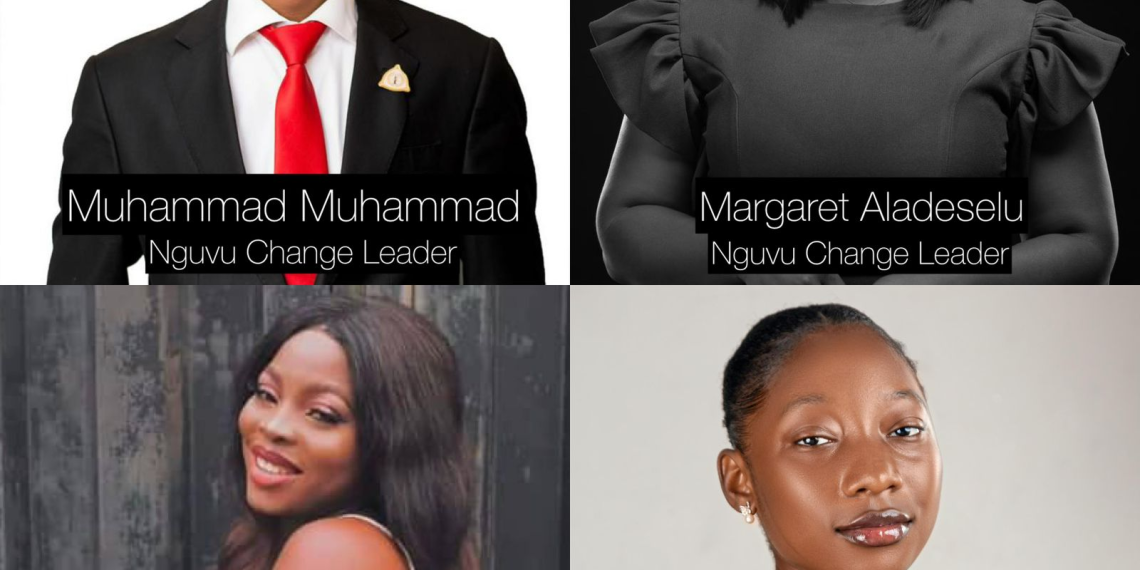In every corner of Nigeria, millions of girls dream of a better future. A future where their right to health, education, and dignity is unquestioned. But today, as 7.6 million girls remain out of school, split between 3.9 million at the primary level and 3.7 million at the junior secondary level, many of these dreams are deferred. Over 50% of girls are not attending school at the basic education level, and for too many, issues like period poverty, early marriage, and female genital mutilation (FGM) stand in their way.
On this International Girl Child Day, four advocates; Margaret Aladeselu, Muhammad Muhammad, Miriam Omede, and Victoria Augustine, who are leading campaigns to bring the dreams of Nigerian girls to life. These Nguvu Change Leaders are fighting for equitable access to education, better health resources, and the dignity every girl deserves. Their stories and the girls they fight for carry the hope of a brighter future.
Margaret Aladeselu
A feminist writer and gender activist based in Lagos, Nigeria, has garnered global attention through her tireless work to end period poverty and provide access to sanitary menstrual products for girls from low-income families. Her online petition urging the Federal Ministry of Women’s Affairs to remove taxes on menstrual products has gained strong support from various changemakers and the public. Through her campaign, Margaret also questions the double standards of authorities in addressing issues related to sexual health, citing that even at University, condoms were made freely available on campus, while pads were usually sold at extremely high rates for most female students. She underscores that if safe sex can be prioritised as a sexual and health right, then menstruation, a compulsory biological phenomenon for women, should receive equal priority. Margaret believes that favourable policies can ensure all period products are tax-free and more affordable.
Miriam Omede: Tackling Period Poverty in Kogi State
Miriam Omede’s campaign comes from a place of deep personal pain. Growing up in Kogi State, she often found herself in an agonising dilemma: stretch a single menstrual pad for days or miss school. She remembers the embarrassment of sitting in class, fearful of leaking, or staying home altogether because her family couldn’t afford a new pack of pads that month.
“I remember the shame. I remember how it felt to be the only girl missing class during that time of the month,” Miriam shares. “No girl should have to go through that.”
Miriam’s campaign urges the makers of ‘Always,’ a popular brand of sanitary pads, to subsidise their products for girls in Kogi State. She believes that with more affordable menstrual products, girls will no longer have to choose between their education and their periods. Her mission is clear: every girl should attend school with dignity, without the burden of period poverty holding them back.
Muhammad Muhammad: Championing Girls’ Education in the Northeast
For Muhammad Muhammad, the struggle to keep girls in school hits close to home. He grew up in Borno, where violence and insurgency, recent floods have left many schools in ruins. But for Muhammad, it was the girls who were hit hardest. Many were pulled out of school early, forced into marriages, or too afraid to attend due to the constant threat of attacks. Determined to make a difference, Muhammad started a petition aimed at Governor Babagana Umara Zulum, calling for greater investment in girls’ education in the Northeast. He knew that without intervention, the cycle of poverty and insecurity would only worsen.
“I’ve seen firsthand what happens when a girl is denied education. It’s not just her life that’s affected, but her entire community,” Muhammad says, echoing the well-known proverb, “When you educate a man, you educate one, but when you educate a woman, you educate a nation.”
His campaign has inspired many to take action, and he dreams of a Northeast where girls can learn without fear, where schools are safe, and where education is a path to freedom for every child, regardless of gender
Victoria Augustine: A Bold Voice Against FGM in South-East and South-West Nigeria
Victoria Augustine has always been passionate about women’s rights, but her fight against female genital mutilation (FGM) is one that burns especially bright. Serving in the South east of Nigeria, she observe too many young girls subjected to the painful and dangerous practice of FGM—a cultural tradition that leaves lasting physical and emotional scars.
“FGM is one of the most harmful practices affecting girls in my region,” Victoria says. “It’s a violation of their rights, their bodies, and their futures.” As an advocate for sexual and reproductive health (SRH), Victoria’s campaign focuses on ending FGM and ensuring that every girl has control over her own body. She works tirelessly with local communities, raising awareness about the dangers of FGM, and urging traditional leaders and policymakers to take a stand.
Her online petition is calling for stricter enforcement of anti-FGM laws and better support for survivors. Victoria’s ultimate goal is to see FGM eradicated from the region, allowing girls to grow up free from the fear of this harmful practice.These four changemakers represent the voices of countless Nigerian girls fighting for a better future. Margaret, Muhammad, Miriam, and Victoria are not just advocates—they are champions of a movement to ensure that girls across Nigeria have access to the health, education, and respect they deserve. On this International Girl Child Day, their stories remind us that change is possible when we stand together, and when the dreams of every girl are treated as the foundation of a better world.

